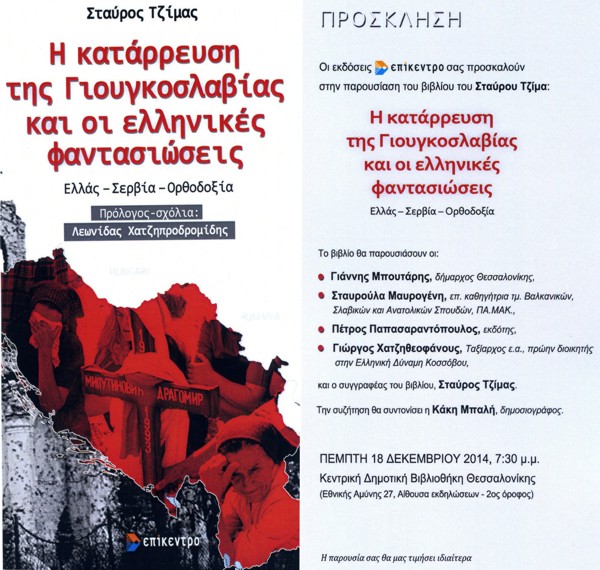Title photo: vojaskimuzej.si
Anastasia Balezdrova
"The book is the product of 25 years of work in a region that, at the time, generated major events, which shook the entire world. From that perspective, I think I am very happy that I was able to experience it all.
Readers will see that this is not a book streaming with blood. I tried to avoid descriptions that would horrify readers. My goal is to explain, with testimonies of ordinary citizens and interviews with leaders who played a leading role in the tragic events, what happened in Yugoslavia and how and why it happened.
My book is not a doctoral thesis about the crisis in Yugoslavia. This is a historians’ job. I wrote about things I saw, heard and learned."
 This is how journalist Stavros Tzimas describes his book "The breakup of Yugoslavia and the Greek illusions" for GRReporter. As a correspondent and director of the Thessaloniki office of the Greek daily Kathimerini, he followed very closely the events that had marked the history of the region over the past quarter of a century.
This is how journalist Stavros Tzimas describes his book "The breakup of Yugoslavia and the Greek illusions" for GRReporter. As a correspondent and director of the Thessaloniki office of the Greek daily Kathimerini, he followed very closely the events that had marked the history of the region over the past quarter of a century.
Tito's death
The book begins with my meeting with a nurse in Ljubljana. She is the woman who closed Tito’s eyes when he died. The story begins from the moment of his death that marks the beginning of the end of Yugoslavia. I have included a description of his funeral, which was the biggest organized funeral until then and which became an international event.
Then immediately I turn to the events of 1991, when the breakup of Yugoslavia began due to the lack of the hand that had held the whole system. Tito was gone, the other pole, namely the army, began to shake and the Yugoslav Communist Party was almost disbanded.
In March 1991, there was a meeting of the Presidency of the Socialist Federal Republic of Yugoslavia and the main topic of discussion was the adoption of a decision to organize a military coup in order to save the federation. The participants failed to agree, which marked the beginning of the first clashes.
The breakup of Yugoslavia
I describe how each of the republics began working for its own cause, presenting to the readers many developments behind the scenes. There are interviews with Stipe Mesic, who was a representative of Croatia in the presidency of the Socialist Federal Republic of Yugoslavia, and then its President, with President of Slovenia Milan Kucan, President of Serbia Borislav Jovic, with Vasil Tupurkovski of the Former Yugoslav Republic of Macedonia (FYROM). They present in great detail all the events that happened during this period.
Another scene presented in the book is how Slobodan Milosevic and Franjo Tudjman divided Bosnia between themselves while eating deer meat and drinking wine in the Karadjordjevo resort. This is also presented with the help of stories and testimonies of people who played a leading role in the events.
The creation of the Former Yugoslav Republic of Macedonia
At a secret meeting held in a government residence in Ohrid, involving Milosevic, Gligorov and Tupurkovski, the spirits had aroused. Afterwards, Milosevic turned to the others with the words, "Good luck, brothers! We will always be united by history and our common enemy, which is Albanians." In this part of the book, I have included an interview with Konstantinos Mitsotakis, which he has recently given me. In it, he tells how Milosevic had offered him the armies of Greece and Serbia to invade FYROM and divide its territory. Furthermore, he had promised to help Greece resolve the dispute with the country's name, but Mitsotakis had refused.

The war in Kosovo and the role of Bulgaria within its context
One of the main topics in the description of the war in Kosovo is the probability of the war transferring to FYROM, then to Greece and of Bulgaria intervening afterwards. I have included a statement of former Bulgarian President Petar Stoyanov, according to which Bulgaria was ready to send forces to Macedonia in order to protect its borders with Kosovo and to prevent the spread of the war there. This statement had a resounding response, as the probable military intervention of Bulgaria would automatically mean the interference of Greece, then subsequently of Turkey, and the Balkans would have been in flames once again. However, the Bulgarian president withdrew the statement and things calmed down.
Another Bulgarian connection with the war in Kosovo is the so-called Horseshoe plan. Years later, Foreign Minister of Bulgaria at the time Nadezhda Mihailova said that during Milosevic's purge against ethnic Albanians in Kosovo the Bulgarian intelligence had submitted to her a copy of the Horseshoe plan, which was presented as the plan of Milosevic for the expulsion of Albanians from Kosovo. Mihailova said that she had immediately submitted the document to her German counterpart Joschka Fischer. Whether the document was authentic or not remains a mystery to this day but at that time, it played the role of a very good argument in favour of the intervention of NATO forces in Kosovo.
Further on in the book, I present the war in FYROM and interviews with Kiro Gligorov, Ali Ahmeti, Boris Trajkovski and Ibrahim Rugova.
The Greek illusions
In the 1990s Greece was shaken by strong sentiments in favour of Serbia. They were not a result of political judgments but of emotions, which were fuelled by the Belgrade propaganda. It claimed that Milosevic was fighting against the establishment of an Islamic state in the Balkans, although there were no signs that something similar was in store at that time. He was also presented as a defender of Orthodoxy in the region, which was the reason for imposing the perception that Greece had to support him.
The belief that he would solve the name issue of FYROM was successfully pushed through as well. Last but not least we have to mention the theories that were disseminated at that time, namely that in the case of war between Greece and Turkey we would rely on the military support of Serbia.
Everything mentioned previously created the illusions that the Greeks and Serbs would solve almost all the problems of the Balkans. In fact, at that time, Greece played an important role in the game of Milosevic to a certain extent.
The Greek soldiers in Serbia
The book uncrowns them of their "glory." I have their testimonies and interviews with people who claim that the Serbs used them as a "tourist attraction". The majority of them were mainly dealing with smuggling and did not actually participate in hostilities. However, what had driven them to go there was precisely these unstoppable Serbophile attitudes that had gripped Greece at all levels. It is significant that even a moderate and experienced politician like Konstantinos Mitsotakis had considered Milosevic as a leader.
Greece and Kosovo
Greece is one of the five countries that has not recognized Kosovo as an independent state. The reason is concerns that this will set a precedent and later it will be forced to recognize the independence of a separate state in the northern part of Cyprus, if it separates from the rest of the island. However, I feel that it is only a matter of time for Athens to recognize Kosovo as an independent state.
The Balkans nowadays
My personal opinion is that the risks for the Balkans are not over yet. Citizens of many countries that have emerged over the 25 years are very disappointed by the fact that the probability of their countries becoming members of the European Union is drifting away. Therefore, they are turning their hopes towards other directions.
A large-scale operation to establish extreme Islam among the Muslim populations in the Balkans is being carried out by Turkey and Saudi Arabia. This explains the fact that there are Muslims from Kosovo, Albania and Bosnia and Herzegovina among jihadists. This is an organized and systematic attempt to radicalise Muslims. Over time, this can lead to de-agglomeration of Christian and Slavic populations, resulting in divisions on religious grounds and even in wars at a later stage.
Nationalisms are smouldering in the Balkans and the risk of destabilization of the region is real.